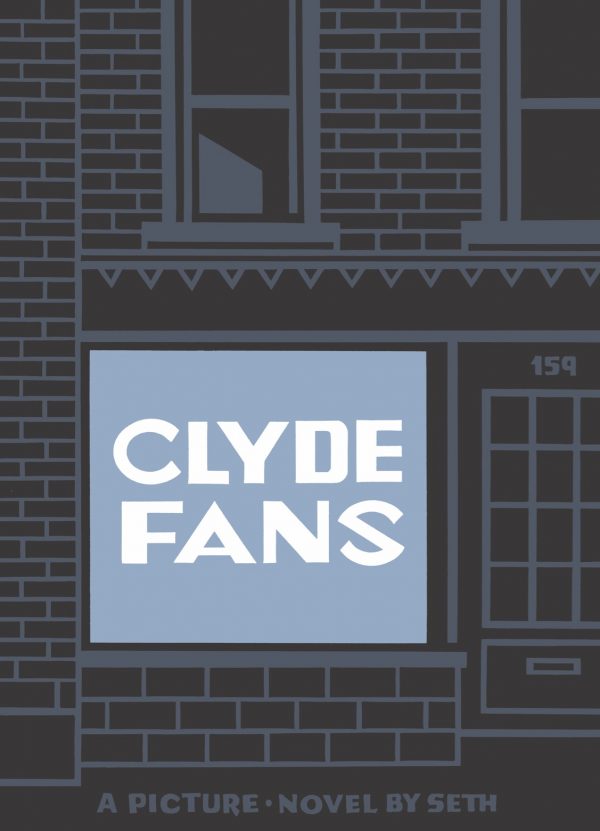
By Seth
Drawn and Quarterly
Brand names, signs, advertising, product catalogs, these are all markers of time as reliable as clocks, and as indicative of what our lives were at the time they existed as any photograph. Old storefronts in a beaten up town are pins placed in the abstract map of your memory and your family history. Products manufactured and purchased are monuments to emotions and needs that now just exist as memories, while the items sit dusty on your shelves at home, reminding you that once, you were there and you felt that.
In Seth’s 20-year project turned dense comic masterpiece Clyde Fans, these are what the panels focus on as much as the people. Their words tell the story, but the items, the brand names, even the sales strategies that get these things out into the world, these are what tell about their soul.
The saga of Clyde Fans — that is the manufacturer of quality fans founded by Clyde Matchcard — begins long after its demise with an extended monologue by old Abe Matchcard, Clyde’s eldest son as he takes readers on a puttering tour of the facilities, where he now lives. The rich details of both the business and the family history unfold through Abes’s ramblings as he not only goes over past events but takes the time to present his conclusions on the meaning of the events after years of lonely analysis that he’s never had an audience for.
It’s a sad and lonely presentation, a tapestry of events that should be exciting and draw his audience in with an alluring and vivid charisma, but other than displaying his salesman-like storytelling talents, it’s an old man addressing a ghost that is barely hanging on in its own haunting grounds.
And so we learn not really the history of Clyde Fans and the Matchcard family, but Abe’s feelings about all that.
Of particular preoccupation for Abe — aside from his sprawling analyses on the complexities of the art of the sale — is his brother Simon’s hobby of collecting postcards with humans standing next to giant vegetables, an excuse to explain the genre and indulge in some psychoanalysis of its appeal, but have no actual appreciation for it. It’s this section of the monologue that reveals Abe’s wider view of humanity, which is anchored by his absolute incomprehension of anything that veers from a normal, understandable path that is only disrupted by brief moments of cleverness meant to recoup the mundanity of the path.
It’s in flashbacks that we get to meet Simon on what appears to be a doomed sales trip. He feels like his own kind of ghost out in the world, wandering silently around the city of Dominion and eavesdropping on the conversations of others. He’s burdened by the pressure of Abe’s sales lectures that spin through his waking mind. He knows what he’s supposed to do, but is incapable of putting Abe’s lessons into motion in a real-life situation. He is captive of what he thinks he’s supposed to accomplish.
Further on, Simon is revealed as the caretaker for his and Abe’s ailing mother, bedridden, with a mind lost in time. But Simon can remember the past in the proper chronology, and he’s haunted by experience in Dominion, and like his brother will be in the future, doomed to wander the halls of his home going over the past obsessively.
And so Clyde Fans reveals itself as being about memories, about their function as perpetual torture that can engulf you. Even in dementia, there is no escape, your body is a shell that has learned to act out the mind’s pain and continues to do so long after the mind has broken. In some ways, Simon is waiting for his mind to break. He feels like he is already a shell, but his mind is trapped inside watching the body’s automated suffering.
In the world of Clyde Fans, biographies are compiled through the meticulous, almost obsessive inventory of various clutter that different characters embrace — factory fixtures, novelty postcards, empty perfume bottles — all doubling as signifiers of tidbits of their lives, charged with the duty of jump-starting the mind before it empties out and, in doing so, preserving the proof that these people existed. It’s proof of humanity via the result of manufacturing. Bric a brac and other possessions announce that you were once there. An old fan implies a human was once there fighting the heat. You were there and you felt that.



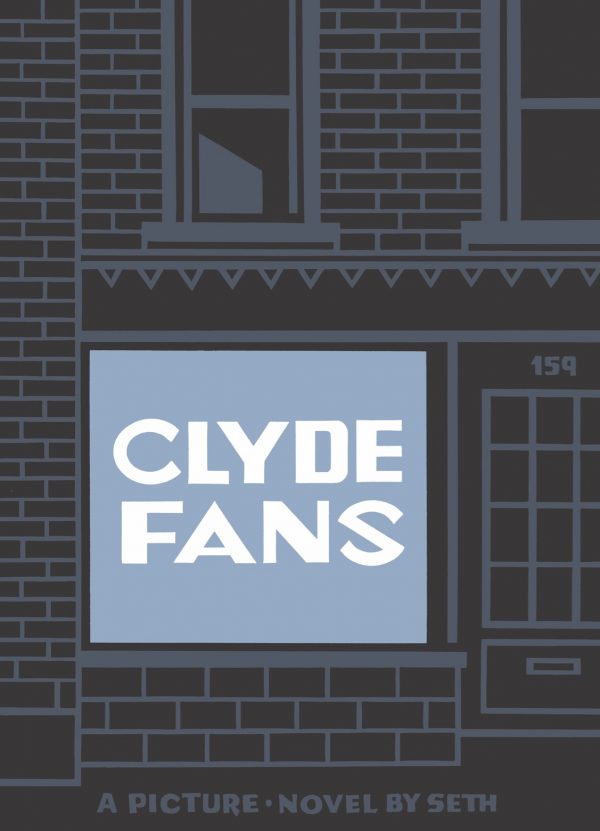
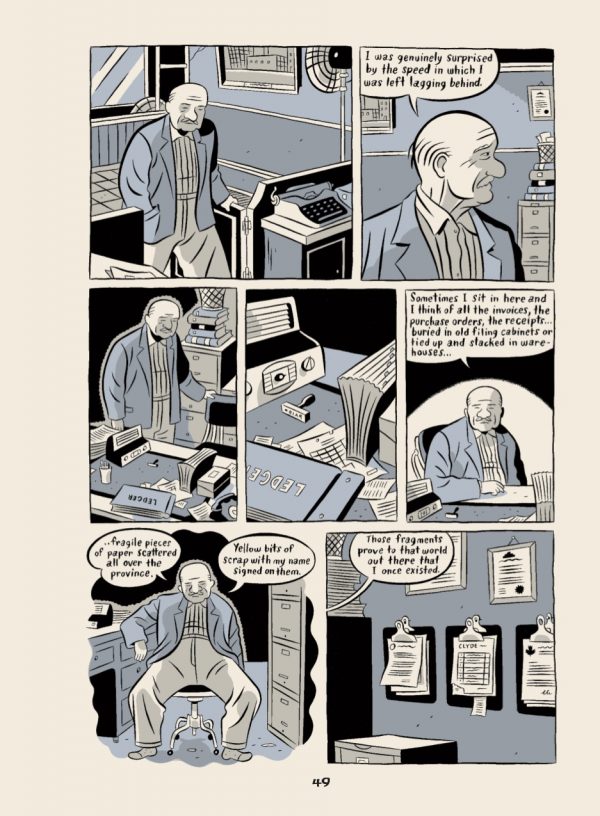
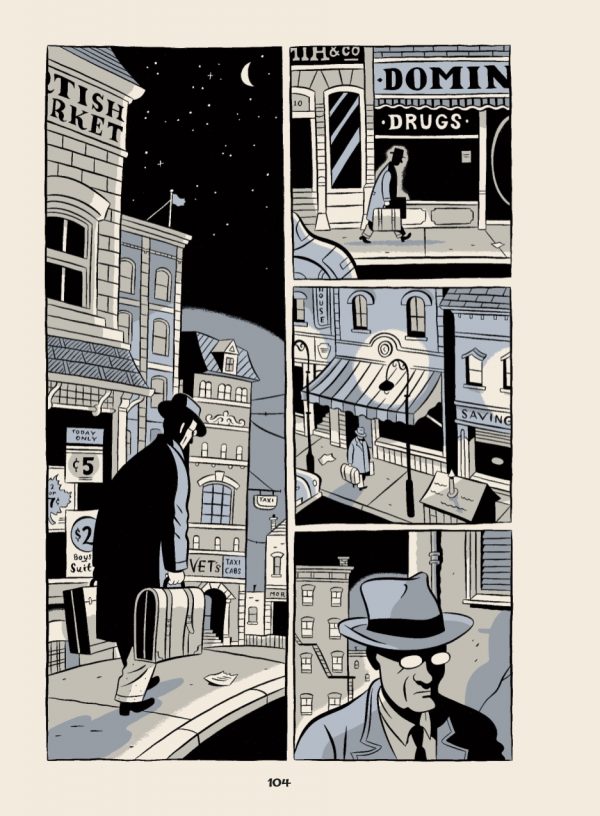
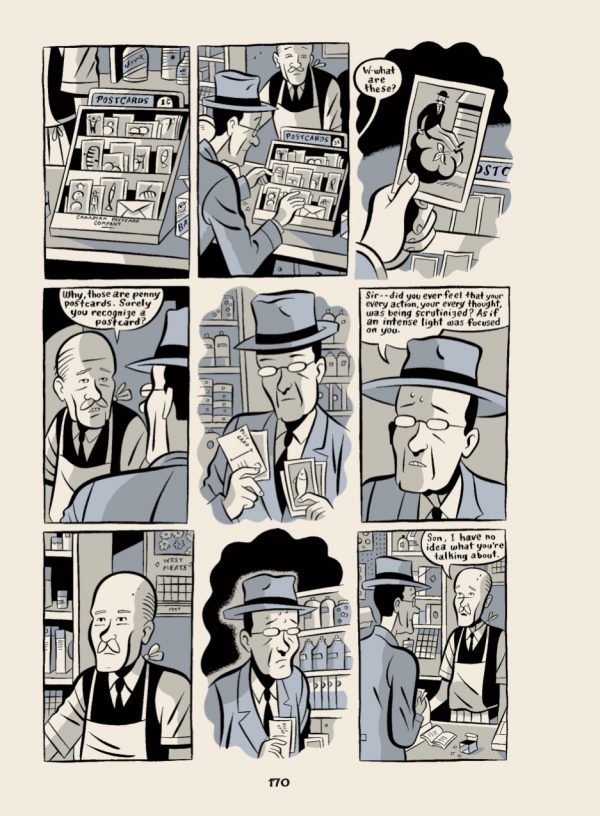


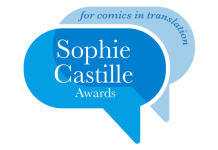




I love the art in Seth’s work, but the prose is always a chore. So, I have no idea how I feel about Clyde Fans because I’ve only looked at it; I’ve never succeeded in reading it.
Comments are closed.